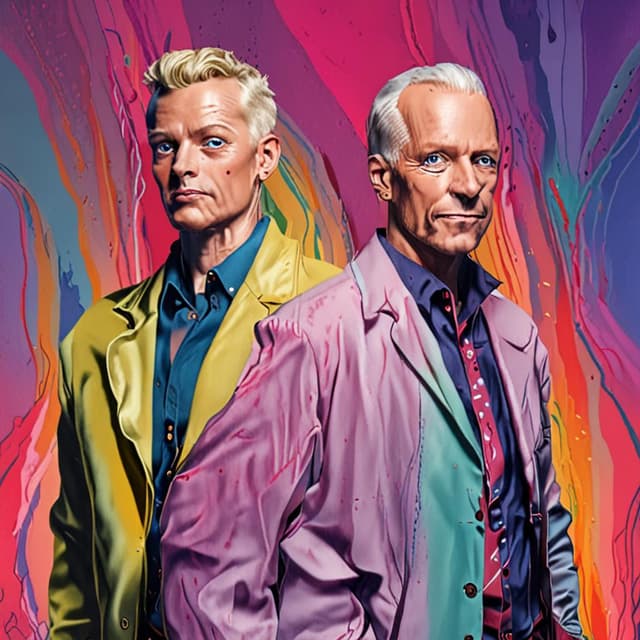
| Formed | 1981 |
| Genres | Synthpop • Electronic dance |
| Origin | |
| Members | Vince Clarke (songwriter) • Andy Bell (vocalist) |
| Achievements | Major commercial success in the 1980s and 1990s • Influential in electronic/dance music through the 2000s • Known for colorful, LGBTQ-positive image and high-energy live shows • Blend of upbeat, melodic dance music and socially-conscious lyrics |
| Years active | 1981–present |
Erasure is an English synthpop and electronic dance duo consisting of songwriter and keyboardist Vince Clarke and vocalist Andy Bell. Formed in 1981, the duo rose to mainstream prominence in the mid-to-late 1980s with a series of hit singles and albums that combined catchy, melodic dance music with socially-conscious, LGBTQ-positive lyrics. Remaining active and influential for over four decades, Erasure is regarded as one of the most important and long-lasting acts of the synth-pop era.
Vince Clarke and Andy Bell first met in 1981 and quickly bonded over their shared interest in synthesizers and electronic music. Clarke had already achieved considerable success as the principal songwriter for the pioneering synth-pop groups Depeche Mode and The Assembly, while Bell had been honing his powerful, emotive singing voice in local pub and club acts around London.
Deciding to join forces, Clarke and Bell formed Erasure in 1981 and began writing and recording their debut album. Their early singles like "Oh L'Amour" and "Heavenly Action" blended Clarke's gift for catchy, danceable synth melodies with Bell's charismatic vocals and the duo's unabashedly queer-positive lyrical themes. This fusion of accessible pop and progressive politics won Erasure a devoted cult following in the early 1980s underground LGBTQ and new wave music scenes.
Erasure broke into the mainstream with their 1986 album ''The Circus'', which spawned a series of international hit singles including "Sometimes", "Victim of Love," and the title track. Building on the success of ''The Circus'', Erasure consolidated their status as one of the decade's biggest synthpop acts with a string of widely acclaimed albums throughout the late 1980s and early 1990s, including ''The Two Ring Circus'' (1988), ''Wild!'' (1989), and ''Chorus'' (1991).
Known for their colorful, theatrical live performances and unabashedly LGBTQ-positive image, Erasure became particularly beloved in the club and dance music communities. While their sound remained rooted in synth-driven pop, the duo incorporated elements of house music, Hi-NRG, and Italo disco into their evolving sonic palette. Lyrically, Erasure became increasingly socially and politically conscious, tackling themes of LGBTQ rights, HIV/AIDS, and other social issues.
By the mid-1990s, Erasure began taking an even stronger political stance through their music and visuals. Albums like ''The Miracle of Christmas'' (1994) and ''Cowboy'' (1997) featured overt critiques of conservative social policies, organized religion, and militarism, often cloaked in the duo's trademark melodic dance-pop sound. The controversial video for the single "Angel" directly confronted the AIDS crisis, while "King of the Killing" condemned the Gulf War.
This more uncompromising political direction earned Erasure both passionate admirers and vocal detractors. However, the duo remained undeterred, using their platform to amplify marginalized voices and advocate for progressive causes. Their willingness to tackle complex social issues through the lens of electronic pop music cemented their reputation as one of the most thoughtful and socially conscious acts of their era.
Despite the shifting musical landscape, Erasure has remained a consistent and influential force in the world of electronic music well into the 21st century. They have continued to tour extensively and release new albums, honing their signature synthpop sound while absorbing elements of emerging genres like IDM, glitch hop, and electroclash. Tracks like "Oh What a World" and "Mouths" have integrated social commentary with infectious dance beats, ensuring Erasure's ongoing relevance to new generations of listeners.
Vince Clarke and Andy Bell's four-decade partnership has outlasted most of their 1980s and 90s contemporaries, cementing their status as pioneers and legends of electronic/dance music. Erasure's catalog of undeniable pop hits, pioneering fusion of activism and club sounds, and continued artistic vitality have solidified their place as one of the most important and enduring musical acts of the late 20th and early 21st centuries.